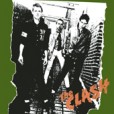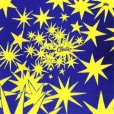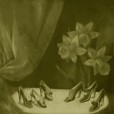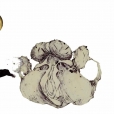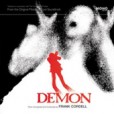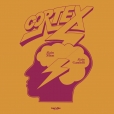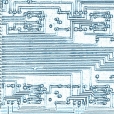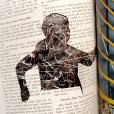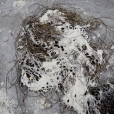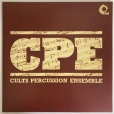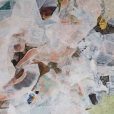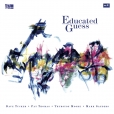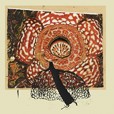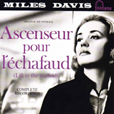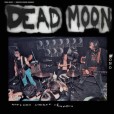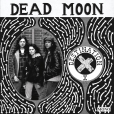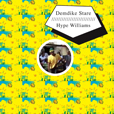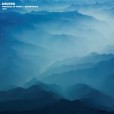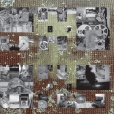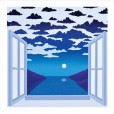Your basket is empty

CD from Reactive.
Snoopy is hard to follow up. The same brilliant musicality is lavished on Orange — a combination of unmistakably original, skittering drum programming, startlingly fresh instrumental interjections, creepily invocatory voices, and dubwise treatments — giddily imbued with the dark arts of ritual and seance. But Orange is more gripping, focussed and urgent, more intense and ambitious. Next level.
Its first quarter presents a trio of forays in suspense.
Bassline squares up like an epic psych-funk grinder, with a moody guitar line traversed by ticking drum patterns and faint electric crackle. In no time the guitar is staggering and stammering under the duress of echo and distortion, and over-run with percussive electronics and the first of the voices massing in the music’s head. The mood has quickly become more trepidatious. We’re deeper underground; it’s gloomier, wetter.
Shred propulsively ratchets up the tension and menace. Glazily tentative xylophone is played against slashing, nervy cello. The voices are more strangulated and sick now. Flutes and chimes evoke the same kind of beautiful, contaminated efflorescence which is pictured on the LP’s front cover.
Voice Of The Spider makes easier progress across this cavernous, shadowy, dripping terrain, with funky pads and Nasty, eighties, No Wave electric bass; woozy chimes, non-plussed keys, singing-in-tongues.
Pink Mist marks an arrival, or unbottling, with annunciatory church-organ and choral voices from the off, and a newly relaxed, head-nodding kosmische rhythm.
Mandarin is a short, beat-less and voice-free interlude for piano and bass. It’s reflective and nostalgic, ambivalent and inconclusive, with a lovely snatch of melody. A bridge half-way.
Would You Like A Vampire is a triumphant, mesmerizing go at New Folk, with strummed acoustic guitar, descant song, and jazzily restless drum programming (including a tasty bass-bin trembler). Amazingly, Conrad Standish is joined at the mic by none other than Bridget St John. Together they sing ‘Earth is Paradise’ so repeatedly and tremulously — and the song is cut off so abruptly at the end — it seems as if the verb is teetering on the past tense, and hymn fading into valediction and catastrophe.
In the same line of thought, Storm Rips Banana Tree begins idyllically enough, with a CS-&-Kreme-style raga… before something like an immense, obliterative drill starts up. Harpsichord and organ — by James Rushford — and flutes, and clapping, distant chanting and insectile percussion steadily leaven the dread, till finally all that is left is lapping water.
It’s an epic, deeply immersive, compelling, thought-provoking, twenty-minute finale… the coup de grâce.
Dreamy percussion exotica by a group of fourteen-year-old students (ten girls, including Evelyn Glennie, and one boy) in Aberdeen, 1978.
Jarvis Cocker’s thrilled to bits — ‘Here, at last, is the the soundtrack to maybe THE underground film of all time in all its crazy daisy glory’. A mental cut & paste of Czech orchestras, folk, jazz and experimental sounds.
‘Experimental jazz, chanson, bluesy folk and various strains of outsider music permeate a rich layering of music boxes, walkie-talkies and plastic straws, plucked charrango and banjo, kazoos, flutes and snake-charming ocarina, accordion and melodica, found percussion and traditional tuned drums. The moods switch from child-like and epiphanic (Tarzan en Tasmanie, Madrigal for Lola) to babbling (Pocarina), mysterious and dark (Septième Ciel, Rugit Le Coeur) to tender and simple (Rainbow de Nuit, Chevalier Gambette); from murky, suspenseful melancholy (Levy Attend, Eno Ennio) to pensive psychedelia (Un Cercueil à Deux Places). A world of echoes. A tale of tales. You’ll be whistling and humming along on first listen.’
‘The opener is a statement of intent — frazzled, shuffling drums, ketamine oud, heavy sub bass — something like Wordsound’s Scarab zooming out of the 90s into the future. Tombaroli is a head nodder, with insistent percussion and banging pulse. A lysergic fever-dream, Bullet Holes dips into spooked psychedelia; No Minus sounds like a distant cousin of DJ Premier’s production Come Clean, for Jeru.
‘Channel 83 lands us back in the club for a rib-rattling stomp, weaving mystical soundsystem magic with its stunted horns and swirling voices. The grimy judder of Expect Excerpt slides proceedings down to a bleary-eyed half-speed, like a party which won’t let you leave. Mount Point is a welcome release, an early morning sunrise — rich, slow, and shimmering — before Landings Dub signals the end of the journey with a metallic elegy; both a summing up of the record, and the contemplation of your flipping it, and re-entering the world of Detraex Corp.’
Originally released by Kuckuck in 1973, Princess Of Dawn ranges library-style from ceremonial, meditative mantra drones (Triad, Deep Sea, Gothic Velvet, Evening), through sun-worship (Tom Bombaddils Dance), to playful, pulsating forays in analog synth (Desert Rock, Synth Effect, Flea Dance, Laser), by way of the traditional music of the Middle East, India and Europe (Arabia, Reed, Phoenix).
Twenty-six fragments of electronica by the Krautrock mystic, like stepping stones between the phase of music-making which culminated in Aum the previous year, and his imminent departure for Bhagwan Shree Rajneesh’s ashram in Poona, home to key-works like Celebration, Haleakala, Ecstasy and Silence Is The Answer.
Astounding, deeply exploratory, previously unreleased work by the legendary Brazilian percussionist and composer.
A wild and unsettling collage, implacably original and startlingly intense — from the electroacoustic opener, which channels ancestral African inspirations into cosmogony, through the proto-mixtape Exemplo de Sintetizadores, which transitions from transcendental drones to astral cha-cha-chas, to a musical consideration of dripping water, in Suite Contagotas.
Djalma is best known for his studio work on benchmark albums, including numerous classics by Caetano Veloso, Gilberto Gil, and Jorge Ben, and for his own polyrhythmic opus Baiafro; and the finale here was first performed at the 1964 Nós, Por Exemplo concert, an event often cited as the inauguration of the Tropicalia movement. Djalma brings the electronics — medical oscillators, for example — to beef up his percussion. It’s eye-opening.
Corrêa called it ‘spontaneous music’; sonic adventures ranging audaciously across an array of genres, from jazz to deep funk to complete abstraction, all imbued with his signature DIY ethic.
Drawn from the original master-tapes, guided by Corrêa himself, just prior to his death.
Intriguing, immersive music. Dazzling, engrossing artwork, too.
